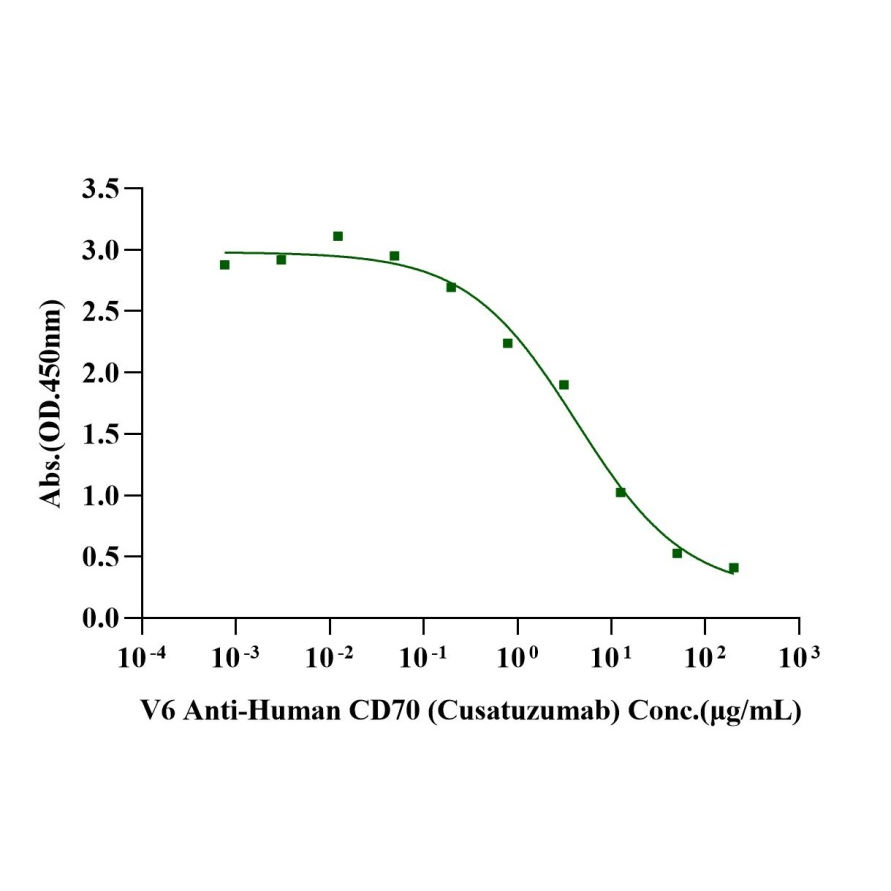2μg (N: non-reducing condition).
Product Details
Product Details
Product Specification
| Species | Cynomolgus |
| Synonyms | CD27L, TNFSF7, CD70, CD70 molecule, TNFSF7, CD27-L, CD27LG, Ki-24 antigen, TNFSF7G |
| Accession | G7PYU6 |
| Amino Acid Sequence | Gln39-Pro194 with His tag at the C-Terminus |
| Expression System | HEK293 |
| Molecular Weight | 25-45kDa (non-Reducing) |
| Purity | >95% by SDS-PAGE&>90% by SEC-HPLC |
| Endotoxin | <0.1EU/μg |
| Conjugation | Unconjugated |
| Tag | His Tag |
| Physical Appearance | Lyophilized Powder |
| Storage Buffer | PBS, pH7.4, 8% trehalose |
| Reconstitution | Reconstitute at 0.1-1 mg/ml according to the size in ultrapure water after rapid centrifugation. |
| Stability & Storage |
· 12 months from date of receipt, lyophilized powder stored at -20 to -80℃. · 3 months, -20 to -80℃ under sterile conditions after reconstitution. · 1 week, 2 to 8℃ under sterile conditions after reconstitution. · Please avoid repeated freeze-thaw cycles. |
| Reference |
|
Background
CD70, also known as CD27 ligand (CD27L) or TNFSF7, is a type II transmembrane glycoprotein that belongs to the tumor necrosis factor (TNF) superfamily. It is primarily expressed on activated T and B lymphocytes, as well as mature dendritic cells. CD70 functions as a cytokine by binding to its receptor, CD27, which is crucial for T-cell activation, proliferation, and the generation of cytolytic T-cells. This interaction is also involved in the priming, effector functions, differentiation, and memory formation of T-cells, and in the development of plasma and memory B-cells.
CD70 plays a significant role in the immune response by providing costimulatory signals that are essential for T-cell proliferation, clonal expansion, and the promotion of effector T cell formation. Interestingly, on mouse B cells, CD70 has been shown to inhibit the terminal differentiation into plasma cells while enhancing the commitment to memory B cell responses. Additionally, CD70 can induce proliferation and IFNγ production in natural killer (NK) cells.
The expression of CD70 is tightly regulated to prevent lethal immunodeficiency, and it is largely confined to activated lymphocytes and dendritic cells through selective transcription. The restricted expression pattern of CD70 in normal tissues, coupled with its widespread expression in various malignancies, makes it an attractive target for antibody-based therapeutics. Research into CD70 as a cancer target has led to the identification of potential antibody-based clinical candidates, highlighting its importance in both immune regulation and cancer therapy.
Picture
Picture
SDS-PAGE
SEC-HPLC
The purity of CD27 Ligand His Tag Protein, Cynomolgus is greater than 90% as determined by SEC-HPLC.
ELISA
Immobilized CD27 Ligand His Tag Protein, Cynomolgus (Cat. No. UA011088) at 2.0μg/mL (100μL/well) can bind CD27/TNFRSF7 Fc Chimera, Human (Cat. No. UA010395) with EC50 of 5.08-6.78ng/mL.

Serial dilutions of V6 Anti-Human CD70 (Cusatuzumab) were added into CD27 Ligand His Tag Protein, Cynomolgus (Cat. No. UA011088): Biotinylated CD27/TNFRSF7 His Tag Protein, Human binding reactions. The half maximal inhibitory concentration (IC50) is 4.23μg/mL.


